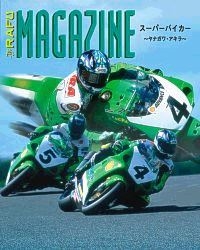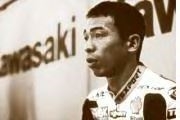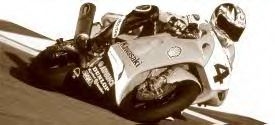 |
| Akiro racing on the cover of Rafu magazine, reprint courtesy of Rafu Shimpo newspaper |
Your adrenaline is pumping. You hear the sound of whining engines. You smell the burning rubber. Your heart races in anticipation of the green flag. As it drops, you find yourself speeding from 0 to over 100 miles per hour in just seconds. Each turn could mean a crash or victory. Everyone is living on the edge. Welcome to the world of Akira Yanagawa.
This 27-year-old, from Kagoshima, Japan, is riding the Kawasaki ZX-7RR in the World Superbike Championship. Working his way up to this championship, Yanagawa is one of only two Japanese Superbike riders in the world.
What started in 1988 because of changes in the technical regulations of the Formula 1 Championship series, Superbike racing has become a worldwide phenomenon. Factory productions, or street legal versions of these bikes, are available to the general public.
 |
| Akiro, reprint courtesy of Rafu Shimpo |
Given the chance to interview up-and-comer, Akira Yanagawa, we communicated via phone, e-mail and fax as he continued on the World Superbike Championship circuit.
Q: What brought about your interest in racing?
A: My first steps on two wheels were actually taken on a push bike. I used to join my brothers in fast riding formation on downhill sections of road near our home _ that was such good fun and I was soon bitten by the bug.
Q: When did you start riding motorcycles?
A: At 16, on a 250cc Yamaha on the roads surrounding my home.
Q: How long have you been racing motor-cycles?
A: Since midway through the 1987 season on a Honda NSR250SP.
Q: When did you start racing professionally?
A: When Suzuki signed me to compete in the 1992 Formula 1 Japanese Championship.
Q: Who is your mentor?
A: I wanted to ride like Kevin Schwantz (considered to be one of the best grand prix riders in the world and is now retired) when I first started racing - he was my hero. But since I moved to World Superbike, I have a new hero - Harald Eckl, my team manager. I have learned a lot from him as a rider and as a person.
Q: How did you become involved in racing Superbikes?
A: I had told Kawasaki that I wanted to compete in the Superbike World Championship, but Rob Muzzy (Kawasaki team owner) wasn_t keen to employ a Japanese rider at that time. Then, when Harald Eckl took over management of the official factory squad at the start of last season, I was in the right place at the right time to claim one of the berths on the new team.
 |
| Akiro racing on his #4, reprint courtesy of Rafu Shimpo |
Q: How did your parents react to your decision to become a professional racer?
A: When I started riding a motorcycle for fun, they didn't like it because they thought that it was too dangerous. When I started racing later that same year, they still didn't want me to do it. Then, one day, I invited them to a race because I wanted them to understand what I was doing and that it wasn't that dangerous really. After that, they supported me in my career.
Q: How does your family feel about you racing now?
A: I think that they want me to compete safely rather than to win races, because they pray for my health every day! If I gave up racing it would be a great relief to them, but at the same time they know very well how much I enjoy it and how important it is to me.
Q: What forms of exercise do you do to prepare for the physical exertions on the racetrack?
A: I ride my mountain bike for at least two hours per day over the winter months, being careful to monitor my heart rate at the same time. Then, sometimes I go to the gym and spend an hour running on the treadmill like an ant.
Q: Do you avoid any kind of exercise?
A: (laughter) Aerobics, because it is difficult for me to find a rhythm!
Q: What is the perfect physique for bike racing in your opinion?
A: It is better to be like a marathon runner than a body builder or a sprinter. Superbike riders need powerful bodies, without being too aggressive - you need to be relaxed.
Q: What have been the best and worst experiences in your career?
A: The best was my win at the A-1 Ring in Austria last year, because it was both my first win on a Kawasaki and in the Superbike World Championship. The worst was my accident at Laguna Seca, because it resulted in the worst injuries that I have ever had in my career.
Q: Do you consider yourself a role model?
A: I consider that my role is to win and promote the green machine for Kawasaki, as well as put on exciting performances for race fans around the world. In these cases, I always try to be a role model.
Q: What advice would you give to young Japanese riders?
A: Study English!!!
Q: Do you feel any added pressure being one of only two Japanese on the Superbike tour?
A: I don't feel any added pressure. Indeed, this year is better because I was the only Japanese rider last year!
Q: How do you adjust to the constant traveling associated with your profession?
A: I am getting used to it and I don't have any particular problems. My wife, Emi, travels everywhere with me - this helps a lot, especially on 12-hour flights between Japan and Europe. Another new experience for me last year was driving a motorhome. I had never driven this size of vehicle before, nevermind on the wrong side of the road! Now I don't find it to be much of a problem and we were surprised at how good the facilities were at European campsites.
Q: Do you have time to experience the culture of the countries you visit during the season?
A: When we drive around Europe, we like to take in some of the sights if we have the opportunity between races. For example, we had fun last year in Paris riding the scooter around the Arc de Triomphe and this year's highlight has been Barcelona.
Q: Do you have any problems with food or do you bring your own supply?
A: We brought 20 kg (about 60 lbs.) of rice and a rice cooker over from Japan when we moved over to Europe this season. Emi normally cooks Japanese food when we are together, except at events, where we like to join the team in the hospitality area.
Q: Where do you live and what is your home like?
A: During the World Superbike season, my base is the team's headquarters at Vohenstrauss, but my home is Hamamatsu in Japan, where I have a one-bedroom apartment. It's not so big, but there is plenty of room for my PC, computer games, satellite TV and radio-controlled cars, which keep me amused when I am not racing.
Q: Where do you see the sport of motorcycle racing in the future?
A: Motorcycle riders and fans are decreasing in Japan at the moment, but as long as there are people who love speed, motorcycle racing will never disappear.
Q: Who do you think are the new and upcoming stars of motorcycle racing?
A: Me! Me! Me! (Ha! Ha! Ha!)
Q: What are your plans for the future?
A: I would like to be the father of one son and one daughter.
Paul Farmer, of the Kawasaki Racing Team, contributed to this article.
Page created on 11/7/2003 12:00:00 AM
Last edited 11/7/2003 12:00:00 AM
